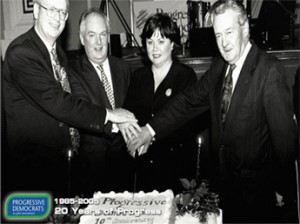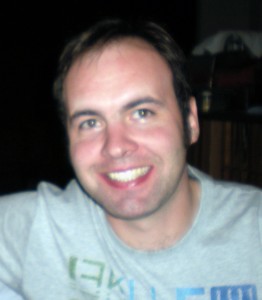RTÉ’s ‘From Boom to Bust’ reviewed
 Cathal Brennan runs a cold eye over a slice of recent Irish history – the now-defunct Progressive Democrat Party – as portayed in the RTE documentary, ‘From Boom to Bust’.
Cathal Brennan runs a cold eye over a slice of recent Irish history – the now-defunct Progressive Democrat Party – as portayed in the RTE documentary, ‘From Boom to Bust’.
Reviewer: Cathal Brennan
A serious television history of the Progressive Democrats is long overdue considering the huge impact they have had on Irish politics during their twenty three year period. Unfortunately Sam Smyth’s recent series for RTÉ is not it. The programmes didn’t provide a satisfactory narrative history of the party or a proper analysis of the PD’s political ideology or economic policies.
The programmes didn’t provide a satisfactory narrative history of the party or a proper analysis of the PD’s political ideology or economic policies
Where the series did succeed was in its interviews with the leading participants and the insights they provided into the personality clashes and conflicts within the party. There was no shortage of memorable soundbites, particularly from Charlie McCreevy, Noel Grealish and Michael McDowell.
The party was formed in one of the most tumultuous periods in Irish politics. The GUBU era saw a state of almost constant civil war within Fianna Fáil and Charlie Haughey survived three heaves against his leadership, which heightened the distrust and enmity amongst its TDs. Unfortunately this period was compressed into the opening five minutes of the first episode and the history of the bitter relationship between Haughey and O’Malley, dating back to the Arms Trial of 1970, was hardly mentioned at all.
One of the limits of the series was that so many of the main participants weren’t interviewed. There was no sign of Bobby Molloy, one of the few politicians to bring a strong constituency machine with him into the party, nor Geraldine Kennedy, now editor of the Irish Times and one of the journalist whose phone was tapped by Seán Doherty while he was Minister for Justice.

Michael Keating, the former Fine Gael TD who, along with Michael McDowell was useful in showing that the PDs were not solely the party of disgruntled former Fianna Fáilers, was absent as was Martin Cullen, who defected from the PDs to Fianna Fáil after the 1997 general election. Along with Mae Sexton, who will be contesting the next general election for the Labour Party, these people would all have brought valuable insights to the programme.
It’s difficult now to appreciate how much of an impact the founding of the PDs had on Irish politics
It’s difficult now to appreciate how much of an impact the founding of the PDs had on Irish politics. Within six weeks of its foundation the party had received 20,000 applications to join and the footage of thousands of people fillings halls throughout Ireland gave some indication of the enthusiasm that greeted it. In the mid – eighties there were punitive tax rates on PAYE workers while we now know that there was massive tax evasion and corruption throughout the Irish economy. Emigration was at its highest rates since the 1950s and the Troubles were still claiming around a hundred lives every year. It would have been interesting to hear the views of ordinary members of the party and what inspired them to join in the heady days of 1985.
The PDs were also part of the liberalising trend in Ireland during the 1980’s. The final break between O’Malley and Fianna Fáil came about over his refusal to vote against the then government’s contraception bill in 1985. The Ireland of the early 1980s was one were divorce was proscribed, contraceptives were only available on presentation of a doctor’s prescription and homosexuality was a criminal offence. The party caused a lot of controversy with its proposal to remove references to God in the Irish constitution.
There was no serious attempt to put the PDs economic ideology into an international perspective. With Reaganomics and Thatcherism at their height the PDs low tax and low government expenditure caught a certain mood within the country and some polls in 1986 placed the party on 25% of the vote. The PDs reached their high water mark of seats in 1987 with 14 TDs elected. The portrayal of the PDs as the uncaring Thatcherite party of Irish politics masked the fact that, especially by the 2002 election, there was very little, if any, difference between the main parties in the Dáil. By that stage the opposition, as well as the government, seemed to have bought into the notion that the Celtic Tiger was here to stay and the property bubble would keep on inflating indefintely.
One of the other problems with the series was its lopsided nature. The first episode dealt with the party from its foundation up to the 2002 election . The second episode dealt with the period from the 2002 election up to the party’s demise in 2009 without giving us any serious analysis into how the policies of that government led the country into recession.
The programme also marked another attempt by Bertie Ahern to rehabilitate himself in the public eye through soft interviews. The PDs had always prided themselves on being the moral watchdogs of Fianna Fáil in government, and this was played on by McDowell’s famous ‘One Party Government – No Thanks’ posters, but when push came to shove McDowell neither withdrew his party from government over the serious questions surrounding Ahern’s finances or gave him his unqualified support and that indecisiveness hurt them at the 2007 election.
The audience would have been left wondering why a small party that is now defunct has arguably had more impact on Irish politics than any other party in the last twenty five years
Overall the series was a disappointment. Despite the access Smyth had to all the main participants the programmes focused more on personalities rather than analysis. While this made for engaging viewing, the audience would have been left wondering why a small party that is now defunct has arguably had more impact on Irish politics than any other party in the last twenty five years. Unfortunately this question was never answered.
 Cathal Brennan was born in Dublin in March 1979 and grew up in Ayrfield. He graduated from Dún Laoghaire Institute of Art, Design and Technology in 2000 having studied television and video production and then was elected to serve in the Student Union for the next two years. After working for the NEAR Media Co – Op he returned to college to study history in Trinity. He has just completed the third year of his course.
Cathal Brennan was born in Dublin in March 1979 and grew up in Ayrfield. He graduated from Dún Laoghaire Institute of Art, Design and Technology in 2000 having studied television and video production and then was elected to serve in the Student Union for the next two years. After working for the NEAR Media Co – Op he returned to college to study history in Trinity. He has just completed the third year of his course.